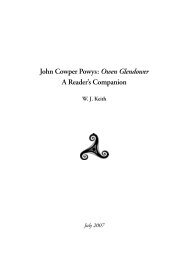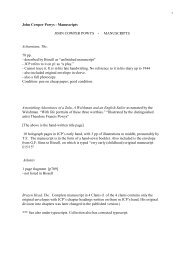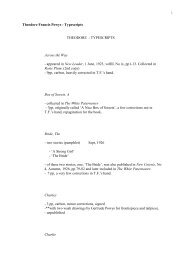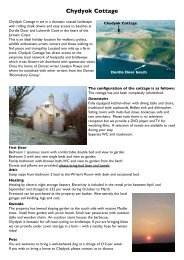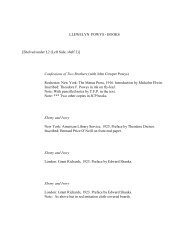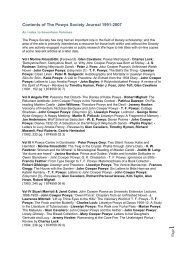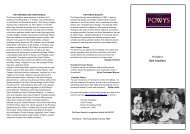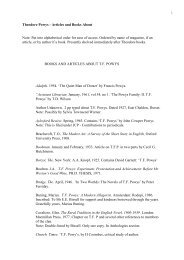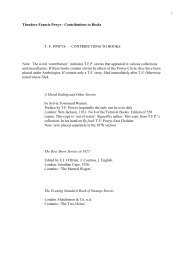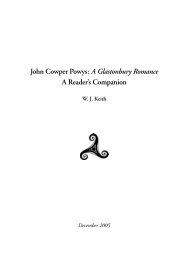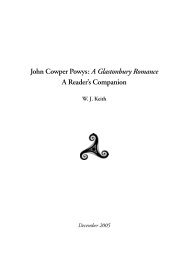J. C. Powys' Autobiography: A Reader's Companion - Site POWYS
J. C. Powys' Autobiography: A Reader's Companion - Site POWYS
J. C. Powys' Autobiography: A Reader's Companion - Site POWYS
You also want an ePaper? Increase the reach of your titles
YUMPU automatically turns print PDFs into web optimized ePapers that Google loves.
24 <strong>Autobiography</strong><br />
The Pleasures of Literature (572) and in JCP’s<br />
introduction to Llewelyn’s A Baker’s Dozen (16).<br />
first of us ... footprints of Jesus (147) — JCP is<br />
referring to Llewelyn’s travels that later resulted<br />
in A Pagan’s Pilgrimage (1931).<br />
five children (4) — John Cowper (b.1872), Littleton<br />
(b.1874), Theodore (b.1875), Gertrude (b.1877),<br />
and Eleanor (1879, who died young).<br />
“floated the measureless float” (511) — From Walt<br />
Whitman’s “As I Ebb’d with the Ocean of Life”<br />
(l.42) in Leaves of Grass. Also quoted in The<br />
Pleasures of Literature (658).<br />
Fluellen (211) — A Welsh officer in Henry’s army<br />
in Shakespeare’s Henry V. His references to<br />
“Monmouth” are found in IV vii 21–54.<br />
“Flying Dutchman” (415) — In sailors’ legend, a<br />
spectral ship is said to sail the seas captained by<br />
an accursed Dutchman. Wagner’s Das Fliegende<br />
Höllander is based on the story.<br />
Fontenelle (230; cf. 441) — Bernard le Bovier,<br />
Sieur de Fontenelle (1657–1757), French prosewriter.<br />
Author of Entretiens sur la pluralité des<br />
mondes. One of the first serious writers to<br />
popularize science.<br />
“for more exciting bread than is made from<br />
wheat” (103) — ”...for better bread than...”, says<br />
Sancho to Don Quixote. From Cervantes’ Don<br />
Quixote (Part II, ch.67).<br />
“for the sake of the blameless Ethiopians”<br />
(650) — “The blameless Ethiopians” is a recurrent<br />
phrase in Homer’s Iliad (Book 1).<br />
“For there is none ... save only” (154) — From the<br />
Anglican prayer-book.<br />
Ford, Ford Madox (390, 547) — English writer,<br />
originally Ford Madox Hueffer (1873–1939),<br />
English novelist, editor, and writer of non-fiction.<br />
Fordington (59) — An ancient community, now a<br />
suburb to the east of Dorchester. Fordington<br />
Great Field, a survival of the medieval fieldsystem,<br />
not far from Max Gate, is also mentioned<br />
in Maiden Castle (32).<br />
Fort, Charles (523, 552) — Occultist (1874–1932),<br />
also an acquaintance of Malcolm Lowry.<br />
Fortitude (511) — A novel by Hugh Walpole<br />
published in 1913.<br />
Fosse Way (346, 572; cf. 628) — A trackway,<br />
probably pre-Roman, upgraded by the Romans to<br />
a road stretching from Lincoln to Exeter. It runs<br />
southwest of Ilchester passing close to Stokesub-Hamdon<br />
and only a mile from Montacute.<br />
This is the Roman road of Wood and Stone (633,<br />
634). JCP follows the usual spelling of his time;<br />
the final ‘e’ is generally dropped nowadays.<br />
Föster-Nietzsche, Frau — See “Nietzsche, Frau<br />
Föster.”<br />
Fou[c]qué — See “La Motte Fou[c]qué.”<br />
Fragonard (301) — Jean Honoré Fragonard<br />
(1732–1806), French painter at Louis XV’s court.<br />
France, Anatole (562) — French author<br />
(1844–1924), who won the Nobel Prize for<br />
Literature in 1921. JCP wrote an essay on him in<br />
Suspended Judgments.<br />
fresh fields (504) — JCP seems to be taking over<br />
the widespread misquotation of “fresh woods” in<br />
the last line of Milton’s “Lycidas.”<br />
Freud (275) — Sigmund Freud (1856–1939),<br />
Austrian psychiatrist who transformed<br />
psychology. Jung had begun as one of his<br />
followers.<br />
Freya (329) — Goddess of love and beauty in<br />
Norse mythology.<br />
friend who will be the hero of my next chapter<br />
(437) — G. Arnold Shaw (q.v.).<br />
“from the house-top” (177) — Presumably an<br />
allusion to Luke 12:3, though the King James<br />
Version reads “upon the house-tops.” No other<br />
use of “house-top” fits the meaning.<br />
Frome (132) — The river that flows through<br />
Dorchester.<br />
Front-de-Boeuf (76) — Sir Reginald Front-de-<br />
Boeuf in Scott’s Ivanhoe. He met his death when<br />
the Castle of Torquilstone was set on fire (ch.30).<br />
Fuller (254) — Thomas Fuller (1608–1681), Royalist<br />
clergyman and chaplain to Charles II. JCP is<br />
referring to his The Holy State and the Profane<br />
State (1642). Llewelyn has an essay on Fuller, “The<br />
Parson of Broadwindsor,” in Wessex Memories.<br />
furious fancies (120) — From an anonymous<br />
Renaissance lyric “Tom o’ Bedlam’s Song,” also<br />
quoted in A Glastonbury Romance (314), The<br />
Inmates (33), and The Pleasures of Literature (315,<br />
498).<br />
G<br />
Gainsborough (301, 412) — English landscape and<br />
portrait painter Thomas Gainsborough (1727-<br />
1788),.<br />
Galsworthy, Mr. (305) — John Galsworthy (1867-<br />
1933), English novelist and playwright, best<br />
known for The Forsyte Saga, the first volume of<br />
which was The Man of Property (511), which<br />
appeared in 1906. He won the Nobel Prize for<br />
Literature in 1932.<br />
Gandhi (455) — Mahatma Gandhi (1869–1948),<br />
Indian national leader, who resisted the British<br />
occupation of India and was at the same time an<br />
advocate of world peace. Assassinated by a<br />
fanatical Hindu who wrongly thought him<br />
responsible for the partition into India and<br />
Pakistan.<br />
Gargamelle (488) — A giant who became the



